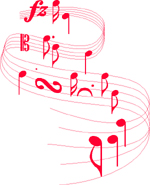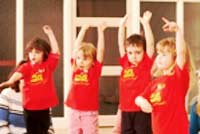Kick start your child's development with music - Healthy Life Essex
Home » Articles » Wellbeing » Babies and Children » Kick start your child’s development with music
KICK START YOUR CHILD’S
DEVELOPMENT WITH MUSIC

Does your baby enjoy listening to music? Do you find yourself singing to your child? Even when you were pregnant did you find your baby would react to loud or stimulating music?
Most of us instinctively understand that our children react positively to songs, but what we may not fully appreciate is how those endless repetitions of “Twinkle Twinkle” are a fundamental part of our babies’ mental, physical and social development, helping our children to “wire up” their brains, develop their speech and improve their co-ordination.
So what is so special about nursery rhymes and how can they help our babies? Firstly, exposing children to music enables their brains to develop more rapidly. When a baby is born, the neurons in the brain are largely unconnected and exposure to different stimuli helps develop their neural networks.
Recent research has shown that music can act as a stimulus to “wire up” the brain more rapidly and speed up a child’s mental development.
In fact, it is believed that exposing young babies to music can increase the speed of neural connections even before they are born.
Music can also help significantly with language development in small children. As babies start to babble, they are picking up the “phonemes” or building blocks of their own language. It may sound like gibberish to start with but through babbling babies will gradually settle on the sounds of their mother tongue, starting with simple utterances such as “mama” and “dada”.
 Babies will imitate sounds and make melodic experimentations, and using simple rhythmic patters and rhymes like those found in nursery rhymes helps them to develop their ability to make meaningful sounds and eventually words. It’s no accident that some of our most popular rhymes contain lots of repetition of those linguistic building blocks (“Baa Baa Black Sheep” and “Row Row Row the Boat” spring to mind). And repetition is certainly key to this process.
Babies will imitate sounds and make melodic experimentations, and using simple rhythmic patters and rhymes like those found in nursery rhymes helps them to develop their ability to make meaningful sounds and eventually words. It’s no accident that some of our most popular rhymes contain lots of repetition of those linguistic building blocks (“Baa Baa Black Sheep” and “Row Row Row the Boat” spring to mind). And repetition is certainly key to this process.  So when your child is asking you to sing the same song for the 15th time, just remember how it is helping them with their speech.
So when your child is asking you to sing the same song for the 15th time, just remember how it is helping them with their speech.
Songs can also help children learn about the world around them. There are lots of number songs, which help toddlers learn to count. And you can also explore concepts such as colours, animals, transport, even telling the time, through song. Playing instruments, dancing, clapping, movement and simple action songs, can also help with your child’s motor skills and develop their general co-ordination.
 And finally, please don’t forget the social and emotional benefits which music can provide. Music builds and strengthens bonds of trust and communication between adults and children and involving a child in musical sessions can help to encourage their self-expression and confidence. Put simply, music is fun for both adults and children alike.
And finally, please don’t forget the social and emotional benefits which music can provide. Music builds and strengthens bonds of trust and communication between adults and children and involving a child in musical sessions can help to encourage their self-expression and confidence. Put simply, music is fun for both adults and children alike.
So if all this sounds great, but you’ve forgotten all your nursery rhymes and don’t know how to introduce your baby or toddler to music, here are some simple steps you can follow to help your child’s development through music.
 Sing to your child regularly. It can be useful to incorporate music into your daily routine – my children have always loved singing at bath time, or my son would be pacified with a favourite song at nappy change time.
Sing to your child regularly. It can be useful to incorporate music into your daily routine – my children have always loved singing at bath time, or my son would be pacified with a favourite song at nappy change time.  Don’t worry if you are not the world’s most competent singer. Your baby is not Simon Cowell and will not criticise you if you are out of tune. Just be enthusiastic and they will love it.
Don’t worry if you are not the world’s most competent singer. Your baby is not Simon Cowell and will not criticise you if you are out of tune. Just be enthusiastic and they will love it.
-
- Make music actively. It’s not enough simply to put on a CD of nursery rhymes unless you join in and interact with your child – it will wash over their head.
-
- Young babies respond most to very simple songs and traditional nursery rhymes. Some CDs available in the shops have complicated rhythms more suited to a nightclub rather than a nursery, so try to avoid these.
-
 Songs using simple actions are great fun and will help improve your child’s co-ordination. Try to incorporate movement or dance around the room if you like.
Songs using simple actions are great fun and will help improve your child’s co-ordination. Try to incorporate movement or dance around the room if you like.
-
 Invest in some percussion instruments – rainmakers, bells, maracas, tambourines, castanets, etc, are all available from local toy shops. Or you could improvise – for example, bang yoghurt pots together, fill a shampoo bottle with dried peas (and fasten securely) to make a shaker, use two saucepan lids to make a fantastic pair of cymbals!
Invest in some percussion instruments – rainmakers, bells, maracas, tambourines, castanets, etc, are all available from local toy shops. Or you could improvise – for example, bang yoghurt pots together, fill a shampoo bottle with dried peas (and fasten securely) to make a shaker, use two saucepan lids to make a fantastic pair of cymbals!
-
- Props are also a fun element of music making. Why not hide behind scarves whilst singing a peekaboo song, use soft farmyard toys for “Old McDonald” or liven up “The Wheels on the Bus” by using streamers with the actions. Try showing your child pictures to accompany the songs they are singing, so they understand the concepts more quickly.

- Props are also a fun element of music making. Why not hide behind scarves whilst singing a peekaboo song, use soft farmyard toys for “Old McDonald” or liven up “The Wheels on the Bus” by using streamers with the actions. Try showing your child pictures to accompany the songs they are singing, so they understand the concepts more quickly.
-
- Help develop listening skills by exploring different styles of music together and see how your child reacts.
- If you haven’t sung a nursery rhyme for 20 odd years and have forgotten all the words, there are lots of ways of reminding yourself. Apart from buying a tape or CD, you could try out a toddler group. Most have a 5-10 minute “sing song” at the end and this will help you to remember some of
 the more popular tunes. Alternatively, joining a dedicated music group such as Jo Jingles will expose your child to a wide range of songs, percussion instruments and props, whilst allowing them to interact with other children.
the more popular tunes. Alternatively, joining a dedicated music group such as Jo Jingles will expose your child to a wide range of songs, percussion instruments and props, whilst allowing them to interact with other children.
Finally, it is not only the kids that benefit. It is believed that musicians are less likely to suffer from senile dementia, so come on mums and dads, why don’t you take your children to a music group and enjoy the benefits with them!
Previous Jo Jingles Franchisee for South Essex Tara Dye,
For more information see our website at www.jojingles.com
